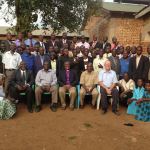This Spring, the seminary praxis course I will be taking is Christian Proclamation. This is essentially our preaching course. At Wesley Seminary, in each praxis course we write an Integration Paper (IP). This is a research paper in which we create a real life scenario that addresses a topic related to the course. The goal is to construct an answer based on biblical exegetical research, theology, church history, and social science. I have come up with two ideas for an IP on preaching.
- Is there an ideal sermon length for American culture today? At Lighthouse Ministries, we have made our sermon time 25 minutes. Having grown up in churches where sermons were at least 45 minutes, I thought 25 minutes was short, but I think it has improved the preaching skills of some of us. We have to be focused. Others on our staff grew up in churches where the pastor or priest gave a 10 minute homily. Those preaching pastors have learned to go a bit deeper when they preach. If I pursue this topic, I have a feeling I may find that good or boring preaching is similar to good or boring teaching by a college professor. A Spirit filled, practiced and well prepared preacher can preach for 10 minutes or 90 minutes and people will call the sermon good, regardless if people are used to receiving information in one minute sound bites.
- If the Black preaching style is so good, why don’t most seminaries produce preachers of that style? That question is loaded with offence. I don’t intend to imply that this style is not good, nor that it is necessarily better than other preaching styles. I know that not everyone likes Black preaching, but I know that a lot of people do enjoy it. That question is loaded with racial issues. Placing all that stuff aside, here is the heart of the matter to me. Black preaching is not something that only African-Americans have the ability to do, any more than saying, “Only Blacks can play basketball, play jazz & the blues, and rap, and only only Whites can play golf and tennis.” Black preaching skills can be learned, both by preachers and congregations. Black preaching makes use of the narrative, which is needed in our post-modern society, which doesn’t know our shared mythology, and has lost the idea of a grand narrative. The style is interactive, so people must use more of their senses to learn, and are less likely to get bored. The style is highly encouraging and motivating, which fits a Missional Church model, in addition to being educational (especially through the use of repetition and surprise). So why is it still called “Black preaching style” instead of “American preaching style”? How this would actually play out as in IP question would be something like, “Should my church switch to a Black preaching style?”
©2011 Paul Tillman







Excellent questions and insights Paul! We can learn so much from Black Preaching. Long before white pastors were talking about narrative preaching, black pastors were doing it. One of the other elements of black preaching that I’m learning from is the use of a metaphor and a mantra. Black preaching has traditionally used a prevailing metaphor to guide their sermon. For example, when I was at KirbyJon Caldwell’s church in Houston, the largest African American UMC in the US, he used the metaphor of lanes on the highway. His mantra, throughout the sermon, was “stay in your lane.” A prevailing metaphor and repeated mantra can add focus and thrust to a narrative sermon. what do you think?
Thank you for adding your prestige to my blog. I think you said more clearly something that I’ve been talking to my youth pastor about, which is, even in a linear sermon it can be helpful to just use one illustration throughout the whole sermon. When you said “mantra” that is what I meant by “repetition,” and “surprise” is when the speaker leaves the mantra for a while, but then comes back to it in an unexpected way.
I am not an expert on this subject; I am just learning myself. I didn’t grow up in a black church. I just visited occasionally with my extended family or friends. I think one of the biggest things I learned was that in black preaching, like gospel music, much of what seems improvised is actually well practiced. It is not that the speaker is just charismatic, but that he or she knows their particular art of preaching, and has spent time in preparation, meditation, and prayer.